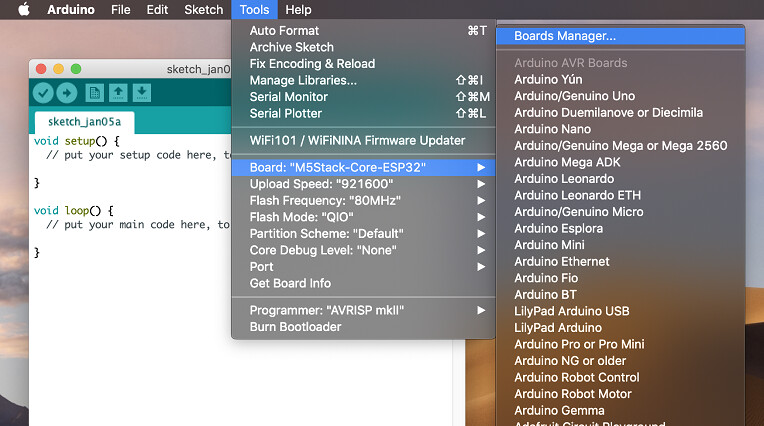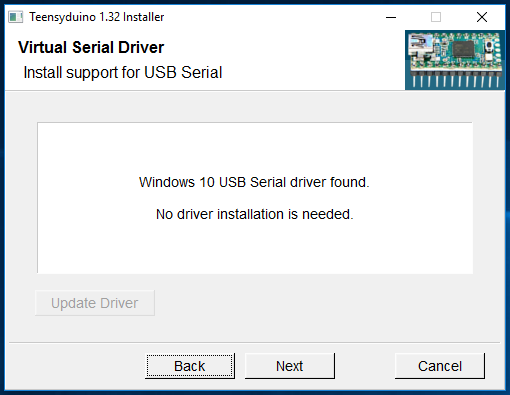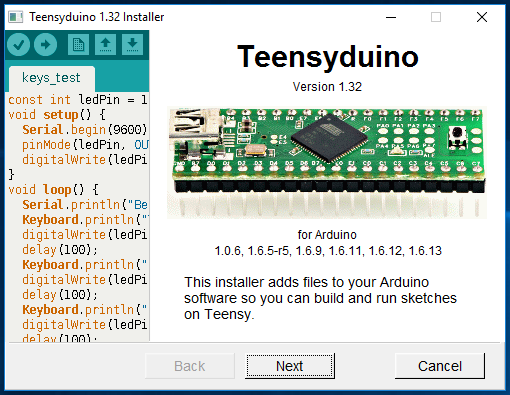The CH340 chip is used by a number of Arduino compatible boards to provide USB connectivity, you may need to install a driver, don’t panic, it’s easier than falling off a log, and much less painful.
Neither is working for me. Not the given driver in Version 1.3 or 1.4 nor the default driver of Mojave. I also tried the new driver from mac-usb-serial.com. Also not working. My workaround: i use an external programmer USBtinyISP. That works like a charm. Permanent Redirect. Learn how to install the ESP8266 board add-on in Arduino IDE in less than 1 minute. This guides works in any operating system: Windows PC, Mac OS X, and Linux. Intel Galileo Gen 2 Arduino Software Package 1.0.3/1.5.3 for Mac OS. Motherboard Intel. Sep 9th 2014, 08:10 GMT. AMD Radeon Pro Enterprise Graphics Driver 21.Q2 for Windows 10 64-bit. Microsoft Surface Book 2 Tablet Firmware/Driver June 2021 for Windows 10. Step 4: Now go on to download the Arduino IDE on your Mac. To do this, open Safari on your Mac and just go to the website www.arduino.cc. Once you have opened the website, go to the software section and click on downloads from the dropdown menu. Now select the Mac OS X version, hit download and wait for the download to finish.
Windows
(Manufacturer’s Chinese Info Link)
- Download the Windows CH340 Driver
- Unzip the file
- Run the installer which you unzipped
- In the Arduino IDE when the CH340 is connected you will see a COM Port in the Tools > Serial Port menu, the COM number for your device may vary depending on your system.
Older Windows Driver Version and Instructions
Download the Windows CH340 DriverUnzip the folder.If you are running a 64Bit Windows: – run the SETUP_64.EXE installer.If you are running a 32Bit Windows: – run the SETUP_32.EXE installer.If you don’t know, try the 64 bit and if it doesn’t work, the 32 bit.In the Arduino IDE when the CH340 is connected you will see a COM Port in the Tools > Serial Port menu, the COM number for your device may vary depending on your system.
Macintosh
(Manufacturer’s Chinese Info Link)
The following github has up to day pkg files for 1.3, 1.4 and 1.5 at time of writing, thanks to Joshua Wallis for bringing this to my attention…
Direct Download Links (from the github repo above):
See the github link above for installation instructions if you need them.
Previous macinstosh downloads if the above doesn’t work for you…
(V1.3) Download the CH340 Macintosh Signed Driver for Mavericks (10.9), Yosemite (10.10) and El Capitan (10.11) and Sierra (10.12)
Inside the zip file you will find a PDF and a “pkg” file, short version, double click the pkg file, the PDF has some extra information.
OSX Sierra (10.12) Note
A kindly user, Maarten Segers reports
FYI, the driver documented here WILL crash on OSX Sierra.


I can personally not test on MacOS and can not vouch for the above drivers at github, but there you go.
See uninstalling information at the bottom of the page if the driver causes problems for you.
Here is an older version of the Mac driver, NOT FOR 10.12 Sierra
(V1.0) Download the CH340 Macintosh Signed Driver for Mavericks (10.9), Yosemite (10.10) and El Capitan (10.11)

Linux
(Manufacturer’s Chinese Info Link)
Drivers are almost certainly built into your Linux kernel already and it will probably just work as soon as you plug it in. If not you can download the Linux CH340 Driver (but I’d recommend just upgrading your Linux install so that you get the “built in” one).
Uninstalling From Macinstosh

A couple of Mac users have said “the driver crashes my mac Sierra how do I uninstall”.
Firstly regards the crash make sure you installed the 1.3 version of the driver, not the old one. You could download it directly from the Manufacturers Website in case they have issued an update since I wrote this page.
Secondly a quick google search reveals that this is how you uninstall:
- Open a terminal and type:
cd /Library/Extensions/ - Verify that the .kext file is present:
ls | grep usbserial.kext - Output should be:
usbserial.kext - Then type:
sudo rm -R usbserial.kext - Verify that the .kext file has been removed:
ls | grep usbserial.kext - Output should be empty.
- After you should remove the files stored in receipts folder:
cd /private/var/db/receipts/ - Find the enties:
ls | grep usbserial* - Output should be:
codebender.cc.ch34xinstaller.usbserial.pkg.bom codebender.cc.ch34xinstaller.usbserial.pkg.plist - Remove each one of the files of the above list:
sudo rm -rfilename`
Mac Arduino Drivers
Help! I'm new to this and feel a bit lost. I've download Arduino IDE 1.8.13 to my MacBook pro recently upgraded to Big Sur (OS X 11.0.1). I have successfully downloaded the driver for my Sparkfun Qduino from the board manager as well as the FTDI USB SerialDriver (v2.4.2).
The problem now is that under the tools/port menu there are no COM or /dev/cu.usbmodemXXXX selection available to communicate and download to the Qduino. Current port selections are only /dev/cu.URT1, URT2 and bluetooth. I have tested all of these and error messages uniformly say 'programmer is not responding' which I'm assuming means I have no COM port access. I have 2 new Qduino mini boards and both have the same behavior.
Any suggestions on how to configure my IDE to get access to a functioning port? Any help is much appreciated.
Thanks